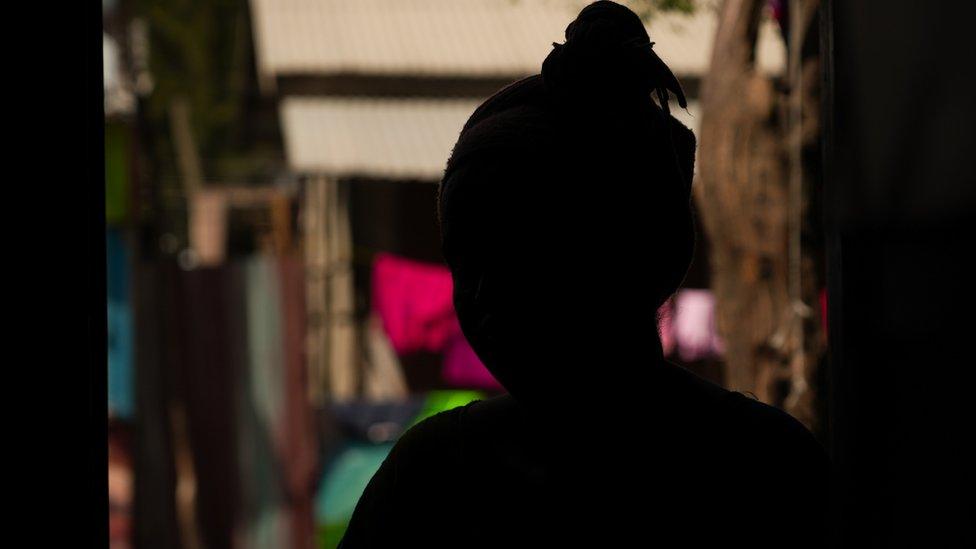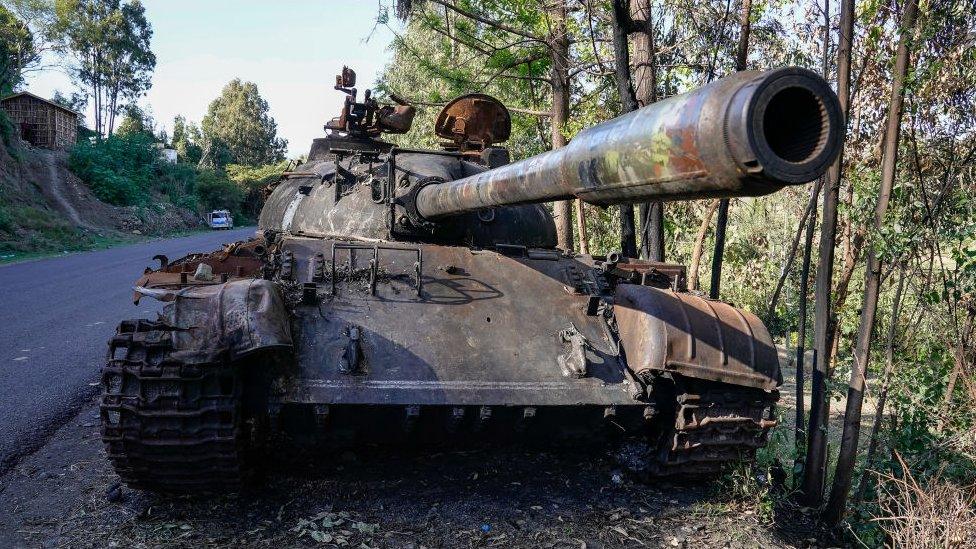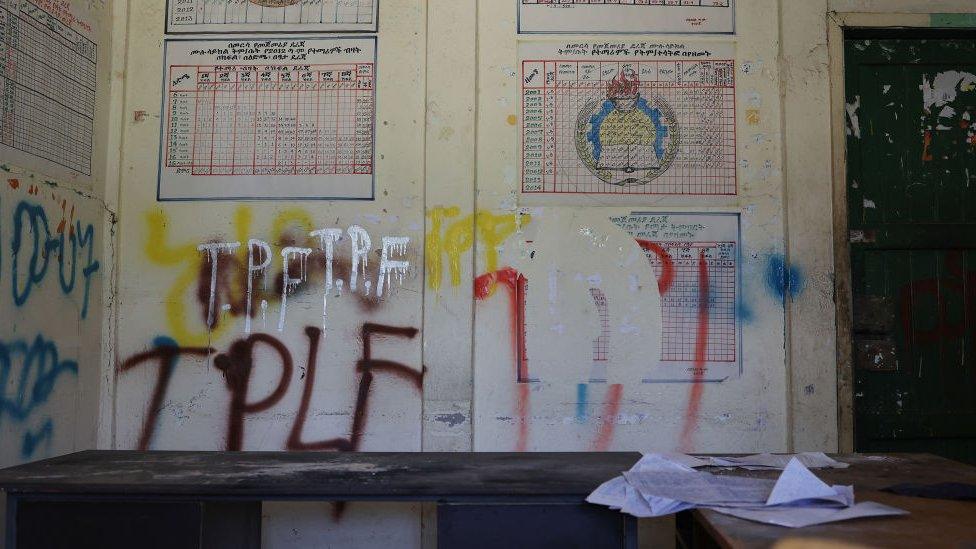Ethiopia's civil war: The women who paid the price
- Published

A truce has been declared in Ethiopia's 16-month civil war, to allow aid to be delivered to hundreds of thousands of people facing starvation. The conflict in the northern Tigray region has seen shocking atrocities committed by all sides, including what human rights call "rape as a weapon of war". The BBC's Kalkidan Yibeltal has spoken to some of the affected women in the neighbouring Amhara region.

Warning: Some readers may find the details in this story distressing
Returning home a month after fleeing advancing rebel forces proved to be a fatal mistake for Zemzem's family.
The young woman, whose name we have changed to protect her identity, ran away from her small town in the Amhara region with her husband and baby son in August last year. They ended up in a rural village.
This was nine months into the civil war that had broken out in Tigray.
The conflict had taken a dramatic turn with the Tigray People's Liberation Front (TPLF) advancing south, seizing territory from government forces, including Zemzem's home town.
She and her husband decided to return home as essential supplies were running out in the village. But walking back into the town, the family was met by a contingent of Tigrayan fighters.
Suspecting her husband, a construction worker, could be a stranded government soldier or member of the local militia, the fighters began questioning them.
Zemzem told the BBC that they were taken to a house by the side of the road where she was beaten and raped by two Tigrayan soldiers in the presence of her child. Her husband was shot and killed while trying to stop the assault.
"I remember my son crying a lot," she said, recalling the events of 26 September 2021.
"There was blood everywhere… I continued to breath but I couldn't say I was alive. My body was bleeding. My legs were numb. I couldn't even move towards my son."
As a result of the beatings scars are visible on her body.
"There was no law - I was alone."
War broke out between the TPLF - a group that dominated Ethiopian politics for nearly three decades - and the government in November 2020 following months of simmering tension.
The fighting has seen thousands killed - including civilians - while millions are in desperate need of humanitarian aid with the federal government accused of hampering relief efforts.
All warring parties have allegedly carried out extrajudicial killings and used sexual violence to intimidate people.
In August last year, rights group Amnesty International accused Ethiopian and troops from its ally Eritrea, as well as forces from Amhara, of targeting women and girls in Tigray for rape and sexual abuse.
Rape was used as "a weapon of war to inflict lasting physical and psychological damage", said Amnesty's Secretary General Agnès Callamard.
The group later accused TPLF fighters of robbing, assaulting and raping women at gunpoint in Amhara - actions that Ms Callamard said "amount to war crimes and potentially crimes against humanity".
The BBC tried to contact the TPLF for comment but received no response. It had previously questioned Amnesty's report accusing its fighters of rape but said it backed the group's call for an independent investigation into atrocities committed by all sides in the conflict.

The wreckage of tanks and armoured vehicles can be seen along one of Amhara's main roads that the TPLF advanced along
Thousands of women and young girls in the two regions have reported sexual abuse to health facilities but a team of experts appointed by the UN's Human Rights Council called the figures "an underestimation of the true extent" of the violence.
In the first eight months of the war 2,200 cases were reported in Tigray and 940 in Amhara.
Kombolcha is an industrial town in Amhara that was under the control of Tigrayan forces for six weeks last year between October and December. Some 35 women and young girls there told the authorities that they had been sexually abused.
The BBC met four of them, including Fatima, who said many more had not reported their attacks.
She was working as a waitress in a ramshackle bar when Tigrayan forces captured the town.
"They entered around two in the afternoon. [Those passing by] told us to close our doors and we did. They later ordered us to re-open and we served them drinks," she said.
Late in the evening a group of soldiers returned.
When Fatima's employer refused to open the door for them, the soldiers fired shots wounding the employer.
The BBC has seen graphic images - taken on mobile phones - of the wounds she sustained.
Fatima said she herself was raped by two fighters that evening and three others the following day.
Three others who worked at the bar were also raped, she said.
After the attack she left Kombolcha and fled to some nearby mountains.
'I will never forget what happened'
Fatima only went back to the town - and her work - once federal troops had turned the tide of the war, pushing the Tigrayan forces out of Amhara, including Kombolcha.
"I don't think I will ever forget what happened to me," she told the BBC, crying, a sentiment that was shared by another woman who said she had also been raped by Tigrayan fighters.

The letters TPLF were spray-painted on to the walls of a school in Mersa, Amhara, that its soldiers occupied
"Sometimes I dream about it. Maybe it's because I stress over it but I feel [the attackers] are still here," she said, lowering her head.
Diana Wondimu is a member of a team of Unicef-funded clinical psychologists who provide support for survivors of gender-based violence in Kombolcha.
In addition to rape victims she works with women and girls who have been physically abused or have witnessed attacks.
"We have found survivors from all age and social groups," she said. And as a result of the attacks "there's always fear hanging" among the survivors. "There's suspicion of others. And there's [a desire] to be isolated."
For Zemzem this feeling meant she had to flee her home for a second time. She went to a camp for displaced people.
For a long time, she said, she could not find ways to express what had happened to her.
"I didn't even have tears. It's only later that I could cry."
Now she hopes to start life afresh and has made friends with other survivors of sexual violence, particularly two sisters who were also raped.
Her main worry is the fate of her son. But he is also the source of solace.
"At least he's here, with me," she said, sitting in the house of one of her new-found friends, their lives entwined by the horrors of war.


The names of the victims of sexual violence mentioned in this article have been changed to protect their identities.